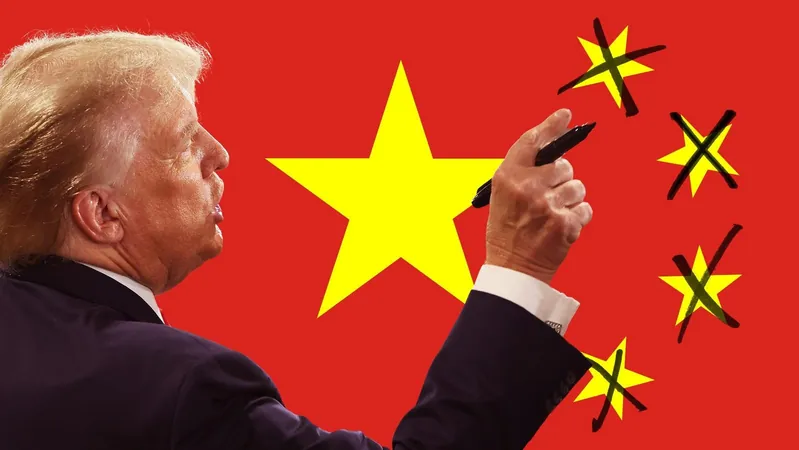
Vietnam Set to Become the New Manufacturing Hub as Trump’s Tariffs Shake Up Trade
2024-11-20
Author: Ying
Vietnam Set to Become the New Manufacturing Hub as Trump’s Tariffs Shake Up Trade
As the global economy braces for the impact of President Donald Trump’s proposed tariffs on imports, Vietnam is poised to emerge as a key player in international manufacturing. Major companies like Apple, Samsung, and Intel have long recognized Vietnam's potential, and with shifting trade policies, this Southeast Asian nation aims to take the place of China as the manufacturing powerhouse.
Trump's administration has promised to impose hefty tariffs on goods from countries like China and Mexico, claiming these measures will reduce the federal deficit, lower food prices, and create jobs in the U.S. However, the reality appears to be different. Manufacturing is unlikely to return to the U.S. at the scale Trump envisions. Instead, experts predict that Vietnam will become the primary beneficiary of these policies.
Professor Jason Miller from Michigan State University notes, “If before it was made in China, now it’s going to be made in Vietnam. That production isn’t coming back to America.” Major foreign firms are already pivoting to Vietnam to diversify their manufacturing options, with SpaceX recently announcing a $1.5 billion investment in the country.
Vietnam's strategic advantages over its regional competitors, such as India, are apparent. As a single-party state, it can implement business-friendly reforms rapidly, and its proximity to China helps ease trade complexities. Moreover, Vietnam's existing free trade agreements, including one with the European Union, position it favorably in the global market.
In recent years, Vietnam has been vigorously improving its infrastructure to attract larger foreign investments. The country has initiated policies allowing companies to buy green energy directly from solar power producers, a move that has received applause from major corporations like Apple and the U.S. embassy in Hanoi.
Despite Trump's plans for tariffs, Vietnam sees this as an opportunity for growth. Anh Ngoc Tran, a governance professor at Indiana University, said that Vietnam could capitalize on this foreign direct investment wave by targeting multinational corporations and focusing on high-tech goods rather than traditional manufacturing sectors.
Vietnam's trajectory has already shifted significantly since the 1990s when it was primarily known for textiles and footwear. By the 2000s, as firms sought cheaper labor and favorable trade conditions, electronics companies began to establish a strong foothold in the country. Now, with significant investments from industry giants, Vietnam has transformed its manufacturing landscape.
According to the U.S. Census Bureau, Vietnam’s trade deficit with the United States has tripled since 2004, solidifying its position as a major trading partner. As Trump’s first administration imposed tariffs on Chinese goods, companies did not relocate their production back to America; instead, they moved operations to Vietnam and other Asian countries, leading Vietnam’s GDP growth to outpace its regional competitors, with an average of 6.2% growth per year.
Vietnam's emergence as a manufacturing hub is supported by statistics highlighting a sharp increase in electronics imports from the country. A recent World Bank report indicated a corresponding rise in Vietnamese exports, illustrating the country’s ability to capitalize on the U.S.-China trade war.
The momentum is palpable, with logistics companies like Maersk setting up operations in Vietnam to facilitate further investments, and Lego investing $1 billion into a new production facility.
As the situation develops, Vietnam continues to align itself with prominent figures of the Trump administration, including a recent $1.5 billion luxury project announced by Eric Trump. Domestic investors, like Michael Kokalari at Vina Capital, view these trends as a ripe opportunity to enhance the economy and bolster Vietnam’s expanding middle class.
The shift in global manufacturing dynamics is undeniable. Just as companies once relocated to China, they are now turning their attention to Vietnam, making it the new frontier in the global manufacturing landscape. As international businesses adapt to Trump’s tariffs, one thing is clear: Vietnam is ready to rise.


 Brasil (PT)
Brasil (PT)
 Canada (EN)
Canada (EN)
 Chile (ES)
Chile (ES)
 España (ES)
España (ES)
 France (FR)
France (FR)
 Hong Kong (EN)
Hong Kong (EN)
 Italia (IT)
Italia (IT)
 日本 (JA)
日本 (JA)
 Magyarország (HU)
Magyarország (HU)
 Norge (NO)
Norge (NO)
 Polska (PL)
Polska (PL)
 Schweiz (DE)
Schweiz (DE)
 Singapore (EN)
Singapore (EN)
 Sverige (SV)
Sverige (SV)
 Suomi (FI)
Suomi (FI)
 Türkiye (TR)
Türkiye (TR)